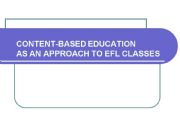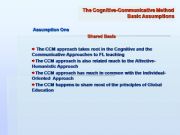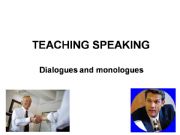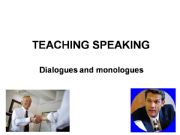
Motivation and stimulation in language teaching
From motivation and stimulation parameters
of speech generation and reception to EFL teaching principles
Motivate any utterance (passive or active)
In case of no real-life motivation, suggest role-playing strategies
State the aim clearly in communicative terms.
Not necessary to explain the mo...
Level: advanced
Age: 14-17
Downloads: 50
|

EFL TEACHING SLIDES Lecture 37 - CONTENT-BASED EFL
Our assumption is that a content-based class,
on one hand, enhances EFL competencies by making the language units relevant in the eyes of the learner, and,
on the other hand, ensures a broader scope of vision, better retention and more profound understanding of other disciplines, whether at seco...
Level: advanced
Age: 17-100
Downloads: 20
|

SEMANTIZATION �SEMANTIZE� BEFORE YOU LEAP
SEMANTIZATION
is a step-to-step process
presupposes a whole range of intellectual operations (mental, intellectual, thinking), to be done to establish lexical and grammatical links in the sentence:
breaking the sentence pattern into logical elements
defining grammatical and lexical meanings
re...
Level: advanced
Age: 14-17
Downloads: 13
|

EFL Teaching a taxonomy of goals and objectives
SIX BASIC APPROACHES TO INTEGRATION
Action-based and action-driven teaching
Systemic teaching
Methodologies-based teaching
Concept and issue-based teachingepisteme)
Metoconcept-based teaching
Anthropological teaching
MODERN REQUIREMENTS TO
LESSON AIMES, GOALS AND OUTCOMES
Communicative s...
Level: advanced
Age: 14-17
Downloads: 25
|

EFL TEACHING BETTER�LISTENING SKILLS �FOR BETTER�PRONUNICATION SKILLS
General features of teaching pronunciation
Teaching pronunciation is important not just because it is necessary to communicate one�s ideas clearly.
Articulation movements accompany the process of using the language not only when a person is speaking but also during listening, reading and writin...
Level: advanced
Age: 18-100
Downloads: 48
|

The Cognitive-Communicative Method�Basic Assumptions
Shared Basis
The CCM approach takes root in the Cognitive and the Communicative Approaches to FL teaching
The CCM approach is also related much to the Affective-Humanistic Approach
The CCM approach has much in common with the Individual-Oriented Approach
The CCM happens to share most of the...
Level: advanced
Age: 14-17
Downloads: 16
|

What audiovisuals and technical devices should be used in EFL teaching?�
audiovisuals and technical devices in EFL teaching
Level: advanced
Age: 14-17
Downloads: 19
|

TEACHING SPEAKING Dialogues and monologues
Teaching dialogue is based on psycholinguistic nature of speech generation (production) and speech reception
A speech stimulus requires use of real communicative situations or invention of an imaginative one
Programming an utterance that includes the stage of structural analysis of the situation a...
Level: advanced
Age: 15-100
Downloads: 27
|

THE ANATOMY OF THE TEACHING PROCESS A LOOK INSIDE THE LESSON
Beginning � 400 words, BGS, BP, EVDT/S
Pre-Intermediate � 800-1000 words, BGS, EVDT/S
Intermediate � 1000-1500 words, CGS, MT/S
Upper-Intermediate � 1500-2000 words, CGS, MT/S
Advanced � 2000-2500 words, All GS, WET/S
Proficiency � more than 3000 words, All GS, AT/S
Sequencing and interrelat...
Level: advanced
Age: 14-17
Downloads: 47
|

TEACHING SPEAKING Dialogues and monologues
Teaching dialogue means arranging a series of training exercises to master all of its possible components � lexical and grammatical models typical of real-life communication � and to train communicative reactions to what is heard
Modify and repeat
Learn and repeat
Answer together according to the...
Level: advanced
Age: 17-100
Downloads: 40
|